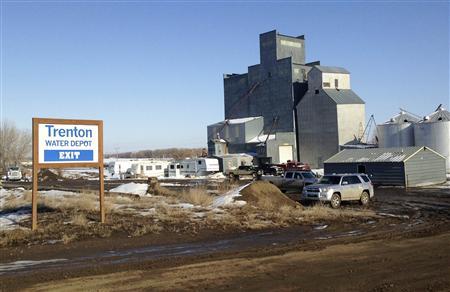The fight for North Dakota's fracking-water market
Date: 20-May-13
Country: USA
Author: Ernest Scheyder

The Trenton Water Depot in Trenton, North Dakota, is seen March 26,
2013
Photo: Ernest Scheyder
(Reuters) - In towns across North Dakota, the wellhead of the North American energy boom, the locals have taken to quoting the adage: "Whiskey is for drinking, and water is for fighting."
It's not that they lack water, like Texas and California. They are swimming in it, and it is free for the taking. Yet as the state's Bakken shale fields have grown, so has the fight over who has the right to tap into the multimillion-dollar market to supply water to the energy sector.
North Dakota now accounts for over 10 percent of U.S. energy output, and production could double over the next decade. The state draws water from the Missouri River and aquifers for its hydraulic fracturing, the process also known as fracking and the key that has unlocked America's abundant shale deposits. The process is water-intensive and requires more than 2 million gallons of water per well, equal to baths for some 40,000 people.
As in all booms, new players race in to meet the outsized demand. At the heart of this battle is a scrappy government-backed cooperative, conceived to ensure fresh water in an area where its drinkability is compromised.
The co-op has decided to sell 20 percent of its water to frackers to help keep prices low and pay back state loans. That has not gone down well with the Independent Water Providers, a loose confederation of ranchers, farmers and small businesses that for years has supplied fracking water.
Since opening in January, the co-op has tried to limit the power of the confederation with an aggressive legal and lobbying strategy. The Independent Water Providers have fought back, arguing that the co-op shouldn't be selling fracking water at all. The state legislature stepped in with a law last month designed to quell the tension and nurture competition, but industry observers expect the acrimony to continue.
"When all of us had nothing (before the oil boom), there was nothing to fight about," said Dan Kalil, a longtime commissioner in Williams County, home to many oil and natural gas wells. "Now, so many friendships have been destroyed because of water and oil."
Jeanie Oudin, an analyst with energy consultancy Wood Mackenzie, predicts the competition could push down North Dakota fracking water prices at least 10 percent in the next few years, or roughly $170,000 per well. That's a sizeable savings in a state where fracking costs are the highest in the country (remoteness meant there was little infrastructure in place). The water accounts for 20 percent of the roughly $8.5 million it costs to drill a North Dakota oil well.
"Regardless of where operators get their water from, the growth in active water depots should increase the availability of raw water for hydraulic fracturing and ultimately bring down costs," Oudin said. The depots are where energy companies buy most of their fracking water.
The North Dakota Petroleum Council, a trade group for Statoil, Hess, Exxon Mobil, Marathon Oil and other large energy companies, declined to comment on the fight or to forecast how much water prices could fall. The council acknowledged that it would prefer multiple sources for the state's 8,300 wells.
Energy companies get most of their water in the state by trucking it from depots to oil and natural gas wells. Some wells require more than 650 truckloads to frack. Companies such as EOG Resources Inc and Halliburton Co are experimenting with ways to reduce their dependence on water.
Fracking water depots, which cost roughly $200,000 to build and can gross more than $700,000 per year, are typically small metal buildings on concrete slabs filled with pumps and small tanks connected to the Missouri River or local aquifers. They can have two to six hookups and fill water trucks with as much as 7,800 gallons of water per visit.
The government-backed co-op has nine water depots to hold the fresh water that is piped from the treatment plant in Williston, about 45 miles north of Watford. It plans to build four more depots throughout the Bakken and hugely expand its pipeline system to bring fresh water to more homes. Small lines from the new pipelines will connect directly to some oil wells.
On the other side, Independent Water Providers member JMAC Resources will build more water depots in the region and a massive pipeline just south of the Missouri River to supply oil wells. Other members of the group have also applied for depot permits.
North Dakota water suppliers do not pay for water, and the state legislature rejected a proposed water tax earlier this year. Each side's plans will rapidly increase the options that energy companies have to access water, further depressing prices.
![]()
© Thomson Reuters 2013 All rights reserved